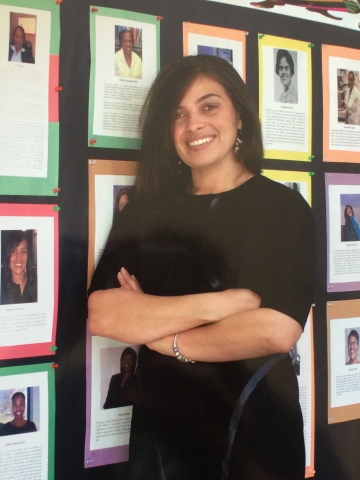Mar152016
Posted at 9:50 AM
Ed. note: This post is part of the Spotlight on Commerce series highlighting members of the Department of Commerce and their contributions to the Open for Business Agenda.
Guest blog post by Brandi Tolliver, Academic Affairs Program Manager, Office of International and Academic Affairs, National Institute of Standards and Technology (NIST)
It is often assumed that the primary responsibility of a scientist is to conduct research and communicate scientific findings through publication and technical talks. With a decrease in the number of Americans pursuing undergraduate STEM (Science, Technology, Engineering, and Math) majors, scientist are transitioning into careers beyond the laboratory which educate society about the importance of science and engineering in general. As a scientist and Academic Program Manager at the National Institute of Standards and Technology (NIST), I have the opportunity to work with universities directly to maximize the retention of undergraduate STEM majors. In my role at NIST, I manage the agency’s undergraduate STEM intern program, the Summer Undergraduate Research Fellowship (SURF) Program, which invites 200 undergraduate STEM majors to gain valuable, hands-on research experience at the Boulder, Colorado or Gaithersburg, Maryland campus.
Born and raised in Ahoskie, North Carolina, a small rural town on the northeastern coast of the state, I had limited exposure to STEM in my local school district. Although the more advanced STEM courses were limited at my high school, I still remember the excitement I experienced while conducting my first experiment in advanced chemistry. As a result of my hands-on experience in my high school chemistry class, I decided to pursue a chemistry degree at North Carolina State University. Not sure if I was interested in completing a doctoral degree, I completed a master’s degree in Chemistry at North Carolina Central University where I studied the physical properties of human hair after exposure to decontamination and denaturant strategies. At the completion of the master’s degree, I finally decided to pursue a doctoral degree in Fiber and Polymer Science at North Carolina State University. My graduate studies were paid for by several competitive fellowships I received including the NIH Bridge to Doctorate Fellowship, the GEM Fellowship, and NASA/Jenkins Pre-doctoral Fellowship.
As the first person in my family to obtain a Ph.D., I have always had a passion for science education particularly among the succeeding generation. In fact, I believe the next generation is the answer to future contributions in science, math, and engineering. Throughout my undergraduate studies, I mentored and tutored elementary aged students in math and science. In graduate school, I volunteered to work with an undergraduates on research projects to encourage them to stay in the STEM field and attend graduate school. Currently, I participate in professional organizations such as the National Association for the Advancement of Black Chemists and Chemical Engineers (NOBCChE) specifically the New Chems on the Block Committee, to educate underrepresented minorities and women recent graduates in STEM on professional and career opportunities through seminars, panels, and roundtables.
As we commemorate Women’s History Month, I reflect on the countless contributions made by women to the United States particularly in STEM. I also believe it’s important to invigorate the next generation of girls by informing them of the innovative contributions made by women in particular. Although women have made several scientific discoveries, there is still work to be done. Currently, women make up half of the workforce, but account for less than 25% of STEM jobs. I am proud to see a national initiative through the Office of Science and Technology Policy in collaboration with the White House Council on Women and Girls, dedicated to increasing the participation of women and girls in STEM fields by increasing the hands-on engagement, encouraging mentoring to support women throughout their academic and professional experiences, and supporting efforts to retain women in the STEM workforce. Additionally, I am grateful to be a part of the Department of Commerce where I have the opportunity work alongside public servants who strive to employ the Open for Business Strategy by devoting countless volunteer hours to science outreach particularly among underrepresented groups and women.
In conclusion, I believe a career in public service is the most impactful opportunity to contribute to the lives of all Americans and individuals around the globe. If you are a young woman considering a career in the federal government, I encourage you to have patience and take advantage of the federal internships/student employment opportunities. Federal internships and student employment opportunities allow you to try out a position without making a permanent commitment. Additionally, internships and student employment opportunities are also the quickest method to obtaining a permanent position. Finally, the government hiring process can be very lengthy so have some patience.




